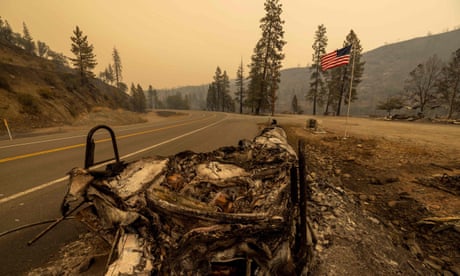- by foxnews
- 08 Apr 2025
Two bodies found in burned vehicle in path of raging California wildfire
Two bodies found in burned vehicle in path of raging California wildfire
- by theguardian
- 02 Aug 2022
- in news

Two people were found dead in the path of the a wildfire raging across northern California, as firefighters raced to contain the blaze amid searing temperatures and impending thunderstorms.
The fire exploded in size over the weekend in a largely unpopulated area in the Klamath national forest, just south of the Oregon state line. Flames had scorched more than 55,000 acres by Monday morning, according to officials.
Despite a massive firefighting effort, the blaze was 0% contained. Crews on the ground worked to keep the fire from moving east into the town of Yreka, home to 7,500 people. Thousands of people in the area had been told to evacuate.
A second, smaller fire burned just to the west. It was sparked by dry lightning Saturday and threatened the tiny town of Seiad.
Meanwhile, fires were raging in Montana and Idaho, flash floods chewed up roads in Death Valley national park and set residents in Nevada and northern Arizona on high alert, and a punishing heatwave in the Pacific north-west set records in Seattle and Portland.
The fire in northwest Montana was sparked in grasslands near the town of Elmo and had grown to about 17 sq miles on Sunday after advancing into forest. In Idaho, the Moose fire in the Salmon-Challis national forest has burned on more than 75 sq miles in timbered land near the town of Salmon. It was 21% contained by Sunday.
Roads in and out of Death Valley national park were closed after mud and debris flowed on to lanes this weekend. On Monday, the National Weather Service issued flash flood warnings for counties on both sides of the California-Nevada border.
Amid the various emergencies, vice-president Kamala Harris prepared to announce $1b to address extreme heat and flooding, and to help communities adapt infrastructure to increasingly volatile weather wrought by the climate crisis.
Earlier this month, Biden unveiled an extreme heat plan, but stopped short of declaring a climate emergency as climate campaigners has urged.
Across the western US, the need for disaster relief funds and disaster-resilient infrastructure have been acute in communities reeling from the concurrent threats of floods, drought, wildfire and heat.
Scientists say the climate crisis has made the western US warmer and drier in the past 30 years and will continue to make weather more extreme and wildfires more frequent and destructive.
- by foxnews
- descember 09, 2016
Ancient settlement reveals remains of 1,800-year-old dog, baffling experts: 'Preserved quite well'
Archaeologists have recently unearthed the remarkably well-preserved remains of a dog from ancient Rome, shedding light on the widespread practice of ritual sacrifice in antiquity.
read more


